Dandruff is typically thought of a human issue, but dogs can suffer from the condition too.
And just like when it occurs in humans, it can cause plenty of irritation (not to mention an unsightly mess). Dandruff is usually a relatively minor issue, but it can occasionally signal the presence of a more serious health problem.
Fortunately, dandruff is usually easy to address, and we’ll recommend a few of the best products for doing so below.
But first, we’ll discuss what doggy dandruff is, what causes it and when you need to seek veterinary attention for your pet.
We’ll also provide an FAQ section at the end to answer some of the most common questions about treating the condition (feel free to scroll down).
Quick Picks: Best Shampoos for Treating Dandruff in Dogs
See our quick picks below, or keep reading for full reviews and more details!
| Preview | Product | Price | |
|---|---|---|---|
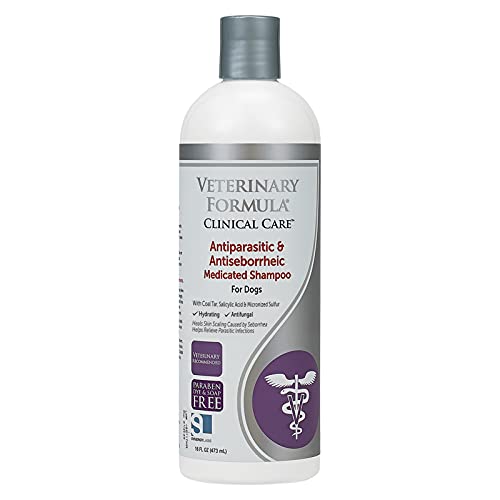
|
|
$8.96
|
Buy on Amazon |

|
|
$20.99
|
Buy on Amazon |
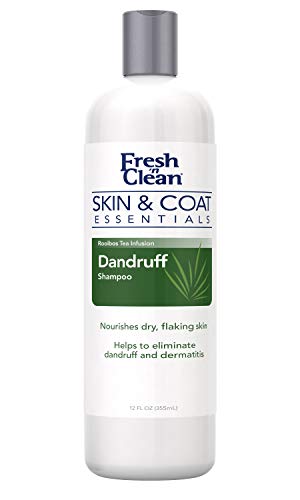
|
|
Buy on Amazon | |

|
|
$19.99
|
Buy on Amazon |
What Is Dog Dandruff?
Dandruff is the name applied to the small flakes of skin that peel off of your dog’s body (or your scalp). Flakey skin is sometimes the only symptom associated with the condition, but it can also be associated with dry, itchy or irritated skin.
Dog dandruff itself isn’t a very serious health problem, but it can also be pretty irritating to dogs and create a bit of a mess in your home. And, as mentioned, it is occasionally associated with more serious health problems. Consequently, you’ll want to address the issue promptly.
Why Do Dogs Get Dandruff?
Dogs can get dandruff for a variety of reasons. Some of the most common causes of the condition include:
Dry Skin – The simplest cause of dandruff is dry skin. This can occur for a variety of reasons, but two of the most common include a failure to drink enough water and living in an excessively dry environment. In fact, many dogs develop dandruff during the winter, when their owners turn up the heat, thereby drying out the air. Consider getting your dog a free-flowing dog fountain to keep water fresh and make water more enticing, and put a humidifier in the area where your dog likes to hang out.
Environmental Allergies – A nearly endless list of things found in the environment can trigger allergies in dogs. These allergies will often lead to dry, itchy skin, which will cause your dog to scratch and scrape off bits of skin.
Food Allergies – Dogs with food allergies often suffer from itchy skin and dandruff. A number of different foods are commonly implicated in triggering food allergies in dogs, including beef, pork, chicken, wheat and fish.
Bacterial or Fungal Infections – A variety of bacteria and fungi (including yeasts) can colonize your dog’s body and leave him with itchy, dry skin. It’s also important to note that these organisms can also represent secondary infections, meaning that they often occur in dogs who are already suffering from some other malady.
Parasites – Several parasites can cause dry skin and lead to dandruff. Fleas are likely the most common culprit, but mites of the genus Cheyletiella actually cause an ailment known as “walking dandruff,” when going about their daily lives.
Nutritional Deficiencies and Improper Diet – Dogs fed substandard or inappropriate diets often suffer from poor skin and coat health. This can cause the skin to dry out and itch, thereby paving the way for dandruff to show up. Consider switching to a higher-quality dog food and see if that clears up your dog’s skin problem!
Obesity – Obesity can cause a wide variety of health problems, and this includes dry skin.
Endocrine Disorders – Endocrine disorders like hypothyroidism and Cushing’s disease are both known to cause dry skin and dandruff. These are two of the more serious causes of the disorder, and they help illustrate the importance of seeking veterinary attention if you are unable to get your dog’s dandruff under control on your own.
Genetic Predisposition – Some dogs inherit the tendency to produce dandruff from their parents. Fortunately, this is a pretty rare condition, which isn’t seen all that often.
What Does Dog Dandruff Look Like?
Dandruff is usually pretty easy to recognize – it doesn’t look like many other health conditions.
Essentially, you’ll see lots of light-colored skin flakes (give or take the size of a fleck of pepper) on your dog’s coat. They’re also likely to coat your dog’s bed, your carpets, the couch and anywhere else he hangs out for long periods of time.
The video below shows a peek at what dog dandruff usually looks like:
If you aren’t sure whether or not your dog has dandruff, put him on a dark-colored bed sheet and scratch him vigorously (which he’ll probably enjoy). Any skin flakes that fall off should be easy to see on the dark sheet!
Dandruff usually occurs over large portions of your dog’s body, but it can also occur in isolated spots.
How do You Get Rid of Dog Dandruff?
In some cases, you’ll be able to treat your dog’s dandruff on your own, but other cases will require your vet’s help. We’ll talk about both possibilities below.
Treating Simple Cases of Dandruff
If your dog is only suffering from simple dandruff that is caused by dry skin or a minor bacterial infection, rather than a serious underlying medical condition, treatment is usually pretty straightforward: You can just use a shampoo designed to eliminate dandruff in dogs.
Many of the best contain moisturizing ingredients, and some also contain medications that can help improve the health of your dog’s skin.
Some of the most common medications and ingredients used in dandruff shampoos for dogs include:
- Benzoyl Peroxide – Benzoyl peroxide is an antibacterial agent, that is effective at killing a number of problematic bacteria living on your dog’s skin. To a lesser degree, it also helps to exfoliate the skin and open clogged pores. Benzoyl peroxide is actually a common ingredient in many human skin-care products.
- Salicylic Acid – Salicylic acid is primarily used to open clogged skin pores. Additionally, because salicylic acid is chemically related to aspirin, it produces a similar anti-inflammatory effect when applied topically. This further helps soothe your dog’s skin and eliminate dandruff. Like benzoyl peroxide, salicylic acid is commonly incorporated into human skin care products.
- Coal Tar – Coal tar is essentially used to remove dead skin cells from the skin, as well as to reduce the itchiness sometimes associated with dry skin and dandruff. It also helps to reduce the rate at which skin cells grow and develop, which helps prevent the skin from becoming “scaly.”
- Sulfur – Sulfur provides a number of benefits to dogs (and humans) suffering from skin conditions. It provides antibacterial and antifungal properties, it helps to exfoliate the skin, and it kills several different types of skin mites. Sulfur smells pretty bad (it is often likened to rotten eggs), but most shampoos containing it also feature fragrances to help cover up the odor.
You’ll often have to use products containing these medications multiple times to completely eliminate your dog’s dry skin and dandruff.
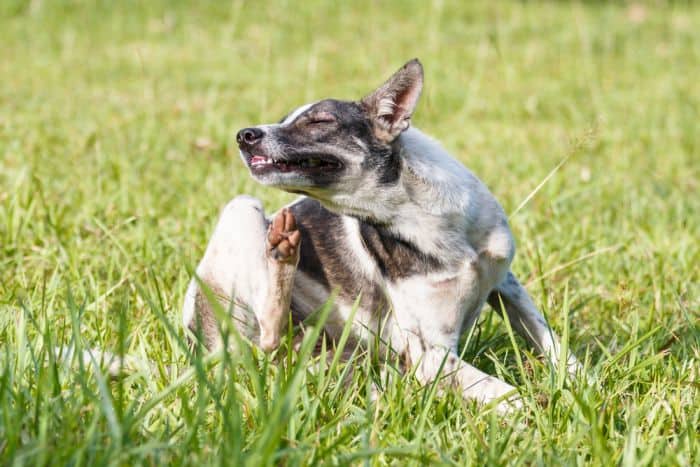
Treating Secondary Dandruff
Secondary dandruff occurs when your dog’s dandruff is caused by some other health condition, and addressing the problem involves first treating the underlying issue.
Shampoos will address these problems in some cases, but it’s important to visit your veterinarian anytime your dog’s dandruff is accompanied by other symptoms, or it fails to clear up after you use a dandruff-treating shampoo.
Additionally, you’ll need to head to the vet to have your dog examined if he exhibits any of the following symptoms:
- Bleeding skin
- Open sores
- Significant discoloration (aside from the minor redness associated with his scratching)
- Any changes in appetite
- Any changes in elimination habits
- Depression
- Any other symptoms that cause you concern
A few of the most common medical conditions that can trigger dandruff include bacterial infections, fungal infections, and endocrine disorders, among others.
Best Dog Dandruff Shampoos: Keeping Away Snowflakes!
The following four shampoos are some of the best products available for treating dandruff in dogs.
1. SynergyLabs Medicated Shampoo for Dogs
About: SynergyLabs Medicated Shampoo for Dogs is designed to help treat a variety of common skin problems, including dandruff, parasites, and fungal infections.
Details
- GENTLE SOOTHING – Helps promote a healthy skin and coat free of flaky, dry, or overly oily skin...
- FAST ACTING – Works fast with powerful ingredients that help shed dry skin and hydrate your pet's...
- VET-RECOMMENDED – This paraben, dye, and soap-free pet shampoo has gentle cleansers and is made...
- FORMULATED FOR DOGS – Specifically formulated for dogs, this pH-balanced shampoo is unlike human...
Features: SynergyLabs Medicated Shampoo is a veterinary-recommended formula, which is made without any soaps, dyes or parabens.
It is pH-balanced specifically for your dog’s skin, and it contains salicylic acid, coal tar, and micronized sulfur, which help it to treat conditions ranging from simple dandruff to sarcoptic mange.
SynergyLabs Medicated Shampoo is designed to be used two or three times per week until the symptoms subside, at which time you can begin using it less frequently.
It will not wash off your pet’s topical flea treatment, and it is safe for dogs 12 weeks of age and up.
PROS: SynergyLabs Medicated Shampoo received very positive reviews from most owners who tried it. It appeared effective in treating a variety of skin conditions, including dandruff. Most owners reported that it was easy to use and that their dog did not mind being bathed with the shampoo.
CONS: Complaints about SynergyLabs Medicated Shampoo were pretty rare, but a few owners did note that the shampoo irritated their pet’s skin (a few owners even noted that the shampoo irritated their own skin as well).
Consequently, it is probably best for owners of dogs with especially sensitive skin to select another product. It’s likely also wise to start by using a relatively small amount of the shampoo the first few times you try it.
2. Pet MD Benzoyl Peroxide Medicated Shampoo for Dogs and Cats
About: Pet MD Benzoyl Peroxide Medicated Shampoo for Dogs and Cats is an advanced veterinary formula, designed to treat a range of skin conditions in dogs, ranging from simple things like dry skin and dandruff to more complicated problems, such as demodectic mange and skin infections.
Details
- Relief of Scaling and Itching from Dermatitis, Skin Infections, and Follicular Plugging to Stop...
- Medicated Shampoo for Relieving Dry Itchy and Irritated Skin.
- Peroxide, Micronized Sulfur and Salicylic Acid for Powerful Cleaning and Degreasing.
- Soap and Paraben Free. Contains Skin Moisturizers and Deodorizers to Effectively Remove Scales and...
Features: Pet MD Benzoyl Peroxide Medicated Shampoo is formulated with an effective triple-cocktail of medications, including not only benzoyl peroxide, but also salicylic acid and sulfur too.
It is made without soaps, parabens, or alcohol to prevent skin irritation and drying, and it includes citrus-scented fragrances to help reduce the odors many sulfur-containing shampoos produce.
This shampoo not only helps to moisturize your dog’s skin, but it also exhibits keratolytic action, meaning that it helps to wash off dead skin flakes. It also kills many bacteria on contact and prevents subsequent colonization of the skin.
This medicated shampoo can be used in small, isolated areas or as a whole-body wash.
PROS: Most owners were very happy with Pet MD Benzoyl Peroxide Medicated Shampoo. In addition to being effective against dandruff, owners also found it helpful for treating mange and dry or itchy skin. It even appeared helpful in stimulating some dogs to regenerate lost hair.
Additionally, unlike many of the other medicated shampoos we reviewed, Pet MD Medicated Shampoo reportedly smells quite nice.
CONS: Pet MD Benzoyl Peroxide Shampoo doesn’t seem to have many drawbacks, according to owner reviews of the product. It wasn’t always effective for treating skin problems, but it didn’t seem to cause any of the problems (such as irritated skin) that some other medicated shampoos do.
A few owners experienced shipping or packaging problems, but these can happen with any product and shouldn’t dissuade you from giving this product a try if it seems appropriate in most other respects.
3. Fresh ‘n Clean Medicated Shampoo
About: Fresh ‘n Clean Shampoo contains medications (0.44% salicylic acid), but it is primarily formulated with naturally occurring ingredients, which should be pretty gentle on your pet’s skin. It is designed to treat a range of skin conditions, but it is specifically formulated to be most effective against dandruff.
Product
Details
- Nourishes dry, flaking skin
- Helps to eliminate dandruff and dermatitis
- Rooibos Tea extract helps calm and relieve the skin
- Glycerin assists with moisture retention
Features: Fresh ‘n Clean Medicated Shampoo is made with a combination of gentle, naturally occurring cleansers, derived from coconuts and palm plants. Salicylic acid is incorporated to help exfoliate your dog’s skin, while olive oil, oat extracts, and glycerin are included to help moisturize and protect your dog’s skin.
Baking soda is also included to help eliminate any odors coming from your dog’s skin, and Aloe vera extracts are included for the skin-soothing benefits they provide. Green tea is also included in this shampoo, to help leave your pet smelling good.
PROS: The owner reviews for Fresh ‘n Clean Medicated Shampoo were overwhelmingly positive. Most owners who tried it reported that it helped clear up their dog’s dandruff and that it remoisturized their dog’s skin. Several owners also mentioned that it had a light and pleasant scent, which made it a pleasure to use.
CONS: There weren’t many complaints about this product at all. A few owners did note that they had to use it on their dog multiple times before it was completely effective at eliminating their pet’s dandruff, but this is not a big problem.
4. Bexley Labs CuraBenz Benzoyl Peroxide Shampoo
About: Bexley Labs CuraBenz is another Benzoyl-Peroxide-based shampoo that is designed to treat a variety of skin problems, including dandruff, demodectic mange, and canine acne.
Safe for use in both dogs and cats, CuraBenz is made in Bexley Labs’ US-based, federally registered and inspected facilities.
Details
- Relieves Itching and Scaling from Dandruff, Skin Infections, Seborrhea, Dermatitis, and Follicular...
- Deodorizes and Gently Flushes Hair Follicles by Removing Excess Oil, Debris and Unwanted Foreign...
- Benzoyl Peroxide, Micronized Sulfur & Salicylic Acid Combine to Create a Super Effective Veterinary...
- Soap and Paraben Free
Features: Bexley Labs CuraBenz Shampoo is a veterinary-strength product, which is available in an over-the-counter form.
Made with benzoyl peroxide, sulfur, and salicylic acid, CuraBenz is not only anti-microbial, it helps to eliminate dandruff, moisturize your dog’s skin, and flush out your dog’s hair follicles.
CuraBenz also exhibits keratolytic action, meaning that it helps to wash off dead skin flakes from your dog’s body. It is soap and paraben free, and it contains added fragrances, to help ensure your dog smells great after using the product.
CuraBenz is also backed by the manufacturer’s money-back guarantee, so you have little to lose by giving it a try.
PROS: CuraBenz received very positive reviews from the overwhelming majority of owners who tried it. Many owners reported that it helped to eliminate their pet’s itchy skin and dandruff, including several who reported that nothing else they tried had proven effective. It even appeared to help several dogs regrow their hair.
Several owners also reported that the shampoo not only smelled nice but that it helped to improve the way their pet smelled too.
CONS: Complaints about this shampoo were quite rare, but a few owners did report that the shampoo exacerbated their pet’s skin problems. Accordingly, as with most other medicated shampoos, it is likely wise to use a small amount on your dog during the first few baths. Once you have verified that your dog’s skin will tolerate the shampoo, you can begin using the normal, recommended amount.
Home Remedies and Supplemental Strategies for Treating Dandruff in Dogs
Besides using a high-quality dandruff shampoo designed for dogs and addressing any underlying medical issues that have led to the dandruff, there are a few things you can do at home to help address dandruff-related problems.
These strategies are unlikely to work by themselves, but they may help improve the efficacy of the dandruff shampoo you use.
Groom Your Dog Regularly
Regular grooming helps to keep your dog’s skin and coat in good condition, which may help clear up his dandruff. Additionally, your hands (or your groomer’s hands) will help to distribute the oils in your dog’s coat, which may help moisturize his skin.
Bathe Your Dog Regularly
Regular baths can help prevent bacterial colonization of the skin, exfoliate the skin a little bit, and wash off any skin flakes before they have a chance to end up on your furniture or carpets.
Just be sure that you use soaps and shampoos specifically designed for dogs, and that you don’t bathe him too frequently. Usually, a once-per-month schedule is appropriate.
Increase the Amount of Omega-3 Fatty Acids in Your Dog’s Diet
Omega-3 fatty acids help to promote skin and coat health, and they also help to soothe inflammation. Many dog foods – especially those designed to remedy skin issues – are fortified with omega-3-rich ingredients, but you can also find omega-3 fish oil supplements that may also prove effective.
Use an Air Humidifier
If your dog’s dandruff is primarily caused by dry winter air, a humidifier may help prevent his skin from drying out. Just be sure that you keep the humidifier in a safe place, as some have hot components, which may injure your dog.
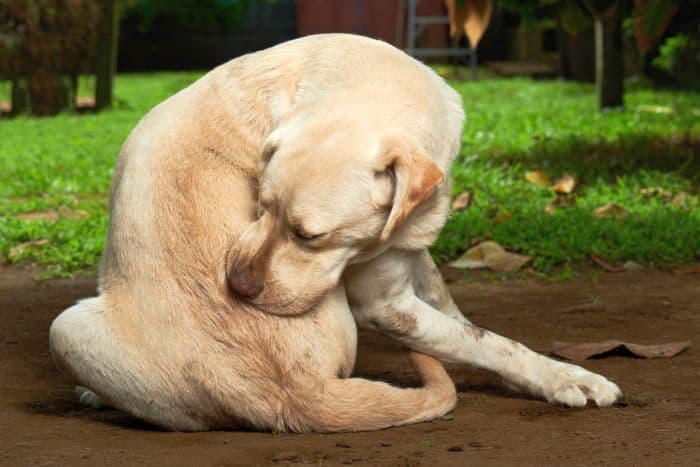
Dog Dandruff FAQs
Dandruff isn’t an especially common problem for dogs, but it sure does generate a lot of questions among owners. We’ll try to answer some of the most common questions owners have below.
Does dandruff cause dogs discomfort?
Dandruff itself – meaning the actual skin flakes falling off your dog’s body – shouldn’t cause your dog any discomfort or pain. However, dry skin, bacterial infections, fungal infections and other conditions associated with dandruff may cause mild to moderate discomfort.
Do you need to take dogs with dandruff to the vet?
You can usually try to treat your dog’s dandruff at home, assuming that he is not exhibiting any other symptoms.
However, you will need to visit the vet if you’re unable to eliminate the problem with a high-quality dandruff shampoo or any of the supplemental treatments mentioned above.
Is dandruff a serious health problem?
Dandruff is usually a pretty mild health problem, but it can occasionally signal the presence of underlying issues, which you’ll want to discuss with your vet. Just be sure to solicit your vet’s advice if the dandruff is accompanied by other symptoms or it doesn’t go away when you treat it at home.
Does coconut oil help eliminate dandruff in dogs?
Coconut oil is the subject of a lot of unsubstantiated hype, but it does appear to be helpful for treating some skin problems.
It is largely safe (although long-term ingestion may lead to problems), so you can try applying a thin film to your dog’s skin about once a week or so (you’ll probably want to rinse it off after letting the oil sit for about five minutes). Just note that a small percentage of dogs are allergic to coconut oil.
Some people choose to mix coconut oil in with their dog’s food. This is probably less likely to help treat your dog’s dandruff that topical use will, and it is more likely to lead to health problems. No matter how you intend to use coconut oil to treat your dog’s dandruff, speak to your vet about it first (or get in touch with an online vet via a service like JustAnswer).
Does olive oil help cure dog dandruff?
Some pet parents add olive oil to their dog’s food to help treat dandruff.
Olive oil is safe for dogs, but you’ll want to be careful how much you provide, as it can lead to health problems if provided in excess (particularly in small dogs).
A teaspoon of olive oil in a full bowl of food probably won’t cause your dog any problems, and it may help eliminate your dog’s dandruff. Just be sure to discuss the issue with your vet if you intend to provide large amounts of the oil or use it over an extended period of time.
Will omega-3 or fish-oil supplements eliminate dandruff in dogs?
Omega-3 fatty acid supplements (which are often, but not always, made primarily from fish oils), may indeed help eliminate your dog’s dandruff.
Omega-3 fatty acids help to promote skin and coat health, moisturize your dog’s skin, and reduce inflammation. Omega-3s may also help to address other types of inflammation, such as joint problems.
If you are considering adding a fish oil supplement to your dog’s diet, check out some of our top picks!
Can you wash your dog with Head & Shoulders?
Generally speaking, it isn’t wise to use human shampoos on dogs, as the pH of your skin is different from that of your dog. This can exacerbate existing skin disorders cause additional problems to develop.
However, some vets do recommend owners use Head & Shoulders to treat some skin problems in dogs (particularly those resulting from fungal infections). The active ingredient in Head & Shoulders – zinc pyrithione – is considered safe for dogs, according to Veterinarian Destini R. Holloway, but you must be sure they don’t ingest it or get it in their eyes.
Again, it’s still best to discuss this option with your vet or talk to an online vet via JustAnswer.
Dandruff is typically not a serious health problem, and if you employ some of the suggested treatments discussed above, you’ll likely be able to stop the problem entirely.
Has your pooch ever suffered from dandruff? What did you use to treat it? Was it caused by dry skin or some other problem? Let us know all about your experiences in the comments below!

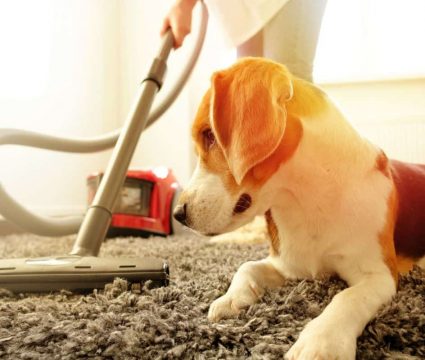
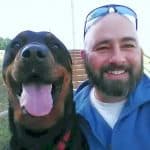


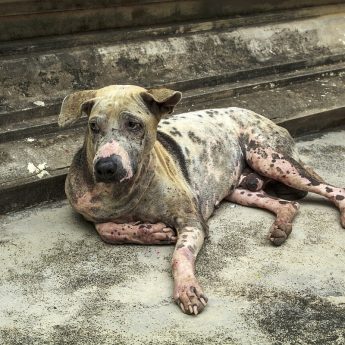
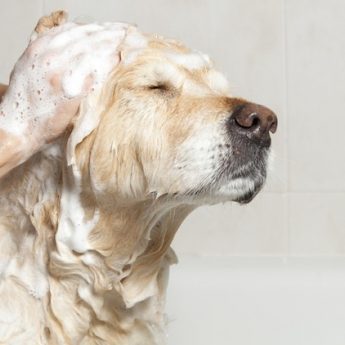

No Comments